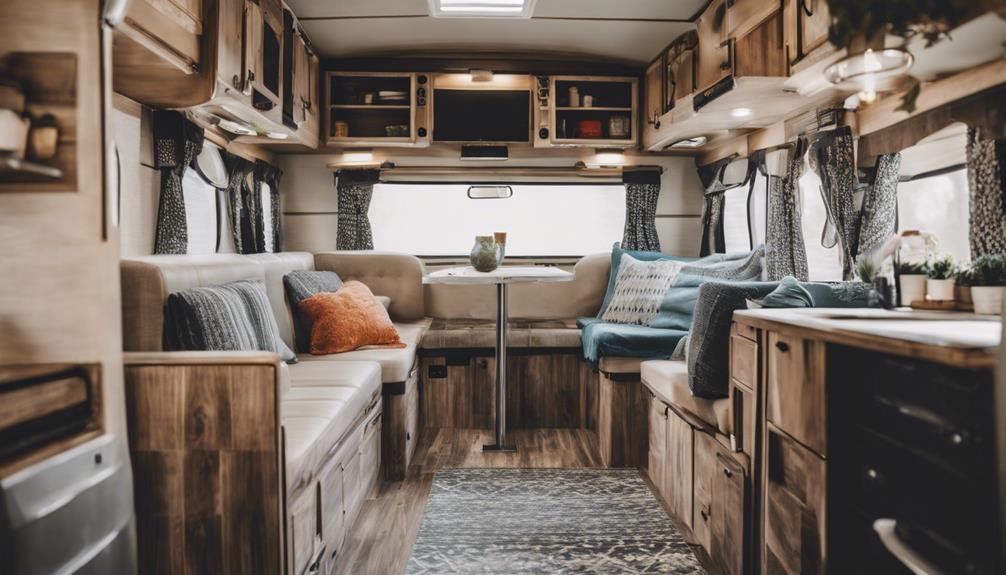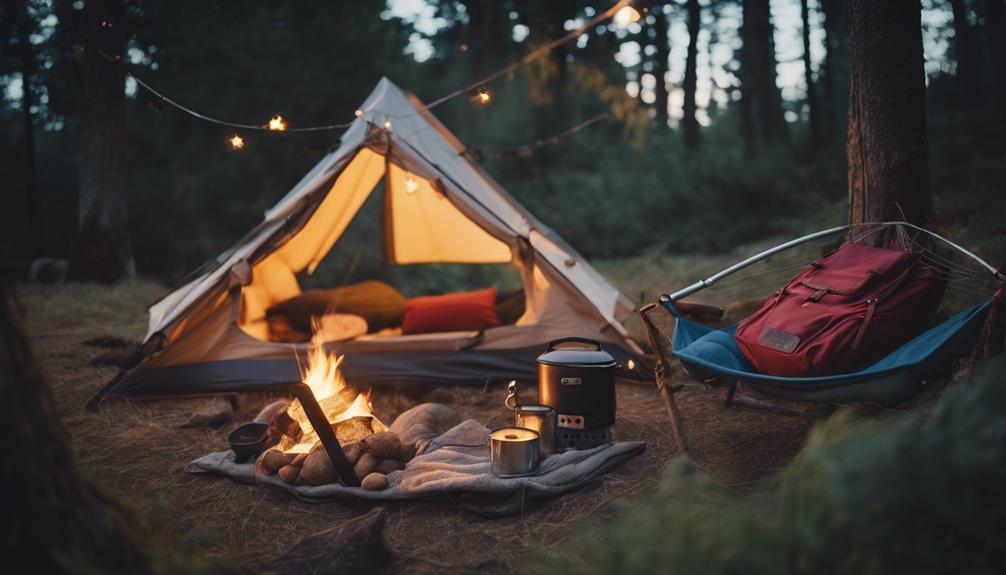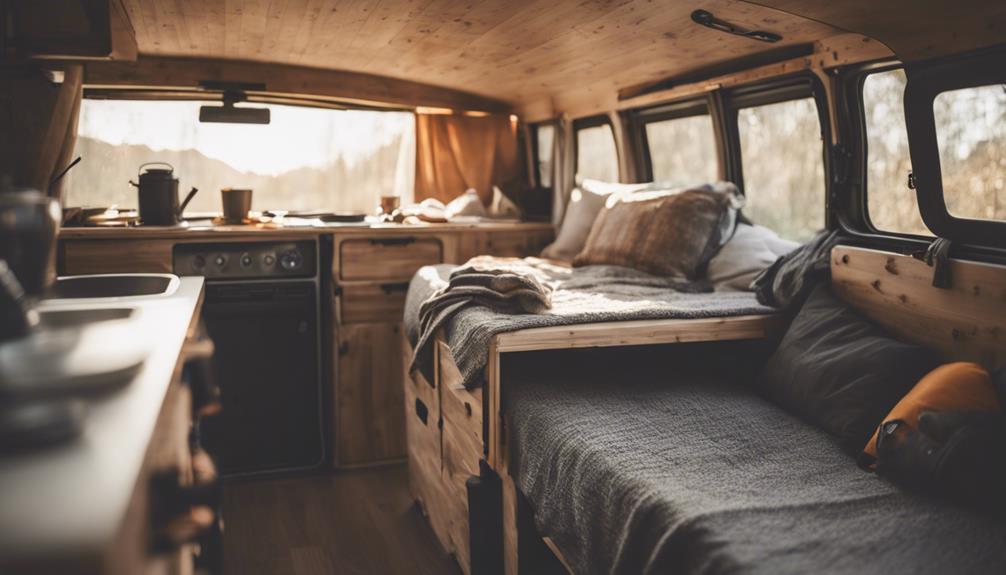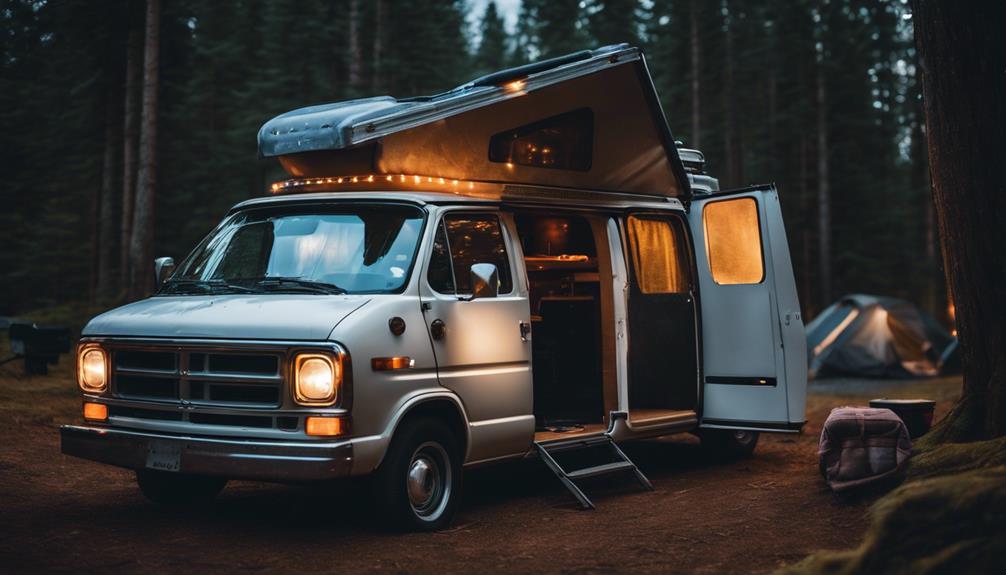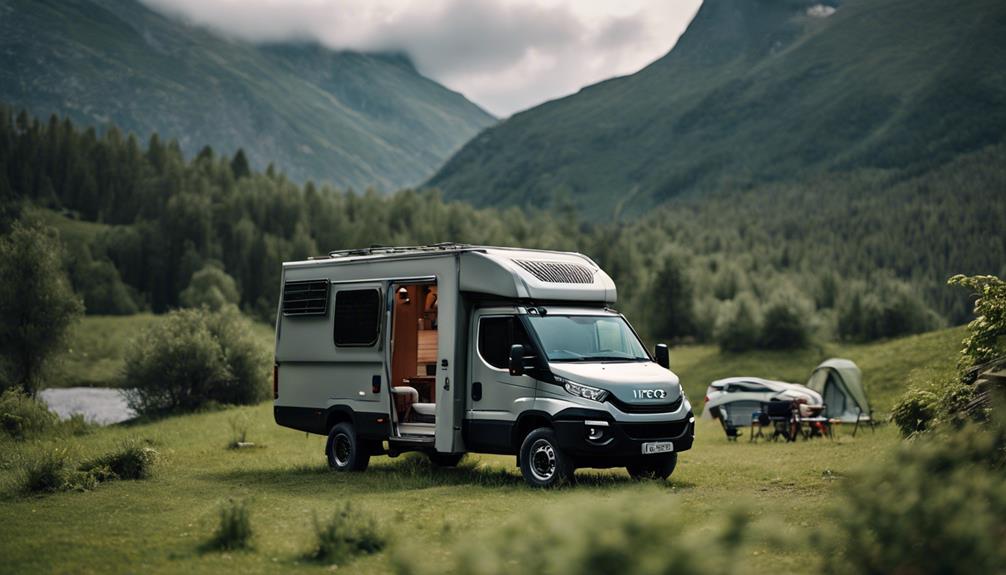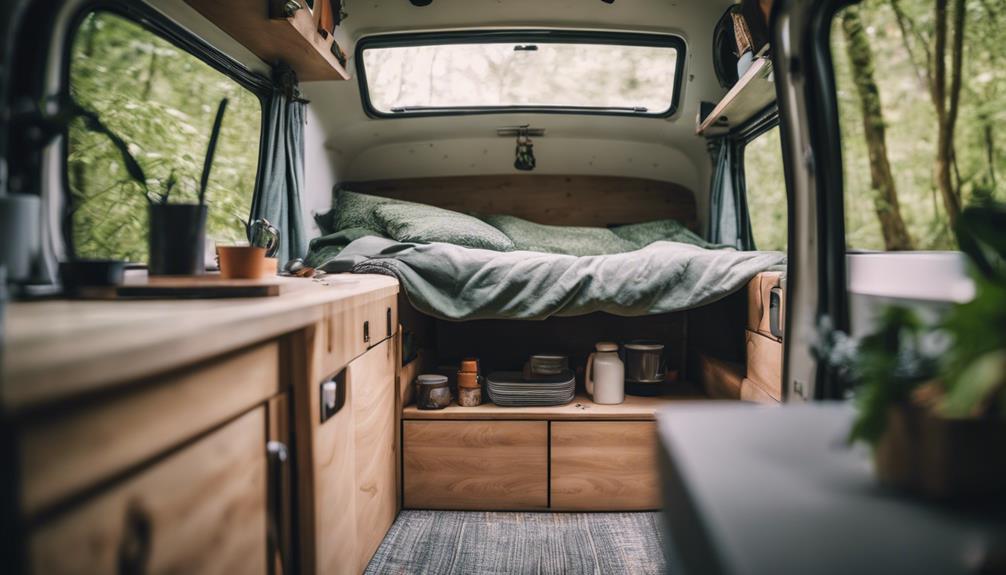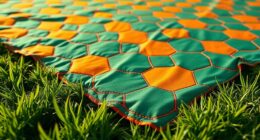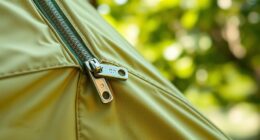When choosing flooring for your camper conversion, prioritize durability and ease of cleaning. Luxury vinyl plank (LVP) shines here; it's waterproof, scratch-resistant, and easy to maintain, making it perfect for high foot traffic and pets. Cork flooring is also a great eco-friendly choice with sound absorption and moisture resistance, though it needs occasional resealing. If you want a sustainable option, consider Marmoleum for its biodegradable materials and low maintenance. For lightweight materials that enhance fuel efficiency, LVP and cork are excellent candidates. Stick around, and you'll uncover even more tips on flooring that fits your camper lifestyle!
Introduction
When it comes to converting a camper, picking the right flooring can make a big difference in both functionality and style. You'll want to focus on options that offer durability and moisture resistance, as these features are vital for maintaining a comfortable living space. Luxury vinyl plank and cork flooring are popular choices for camper van flooring, combining resilience with a variety of aesthetics that can enhance your camper's interior.
Easy-to-clean surfaces are important for camper living, and vinyl excels in this regard. Unlike traditional carpet, which can trap dirt and odors, vinyl and rubber flooring are straightforward to maintain, allowing you to enjoy your adventures without the hassle of extensive cleaning. Plus, lightweight materials like vinyl help keep your vehicle's overall weight down, improving fuel efficiency, especially when towing.
You should also consider the lifespan of your flooring materials. Vinyl typically lasts over 10 years, while carpets may need replacing every 5-8 years. By prioritizing durability, moisture resistance, and aesthetics, you can create a stylish and functional space that meets all your camper conversion needs.
Background Information
When you start your camper conversion, it's important to understand how RV flooring materials have evolved over the years.
Innovations in flooring technology have made it easier to find options that aren't only stylish but also practical for life on the road.
Knowing these advancements will help you make a smarter choice for your camper's flooring.
Evolution of RV Flooring Materials
Over the years, RV flooring materials have evolved remarkably, shifting from basic linoleum and vinyl to innovative options like luxury vinyl planks (LVP) that combine durability with aesthetic appeal. Early RV floors prioritized water resistance and easy maintenance, making linoleum and vinyl popular choices.
However, as technology advanced, LVP emerged, offering a durable and waterproof alternative that mimics the beauty of real hardwood. Carpeting also gained traction in RVs for its comfort and sound absorption, though it typically lasts only around eight years due to wear and tear.
In recent years, a shift toward eco-friendly materials, such as cork and Marmoleum, has reflected an increased awareness of sustainability in flooring options. Additionally, modern RV flooring emphasizes lightweight materials to enhance fuel efficiency and overall vehicle performance.
Options like vinyl tiles and engineered hardwood are now more accessible, providing you with a range of choices that fit both functionality and style. As you consider flooring for your camper conversion, take note of these evolving materials to find the perfect balance between durability, maintenance, and aesthetics.
Innovations in Flooring Technology
Innovations in flooring technology have transformed camper conversions, offering you a variety of durable, stylish, and eco-friendly options tailored for mobile living.
Luxury vinyl plank (LVP) is a standout choice, mimicking real wood textures while being waterproof and easy to clean, perfect for high-traffic areas in your camper.
Additionally, advanced cork flooring provides a unique eco-friendly solution with sound-deadening and antimicrobial properties, enhancing your comfort. If you're looking for sustainability, consider Marmoleum—a natural linoleum made from organic materials available in various colors and patterns that are easy to install.
Newer laminate flooring options, like NatureFlooreko, address concerns about toxicity with their lack of harmful ingredients, making them suitable for smaller living spaces. For a durable and lightweight option, recycled rubber flooring has made strides in improving indoor air quality, though it may scratch more easily than other materials.
These innovations not only elevate the aesthetic of your camper but also guarantee you have a functional, comfortable space that meets the demands of mobile living.
Choose the flooring that best fits your needs, and enjoy a stylish, durable home on wheels.
Recent Flooring Innovations
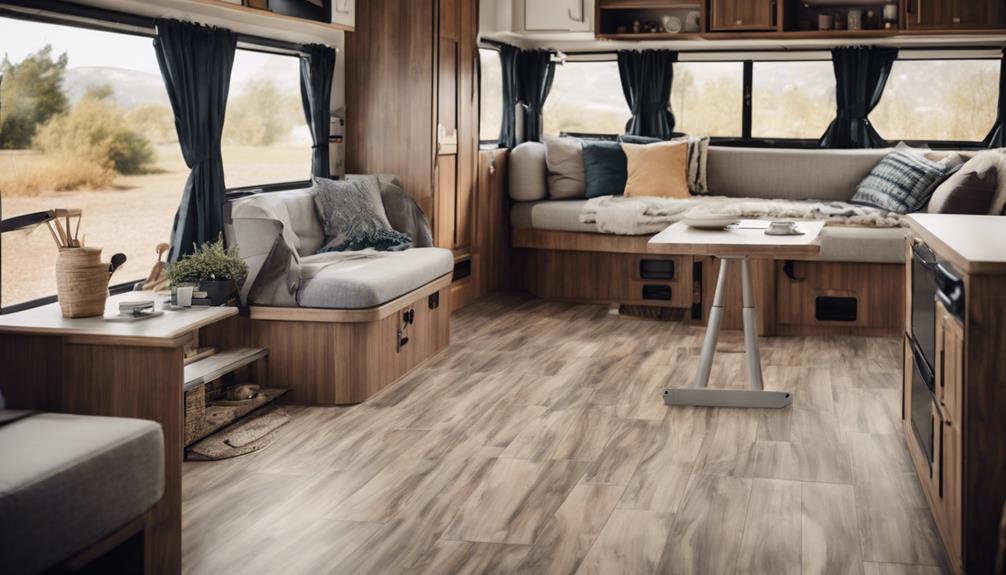
When you're considering flooring for your camper conversion, recent innovations offer exciting options that prioritize both eco-friendliness and practicality.
You can choose from sustainable materials like cork and Marmoleum, or explore water-resistant solutions like luxury vinyl planks and waterproof laminate.
These advancements not only enhance your camper's aesthetics but also make maintenance a breeze.
Eco-Friendly Flooring Materials
Eco-friendly flooring materials are transforming camper conversions with sustainable options like cork and Marmoleum that enhance both comfort and indoor air quality.
Cork, a renewable and non-toxic choice, provides excellent insulation while resisting mold and mildew. It's a fantastic option if you're looking to keep your camper cozy and healthy.
Marmoleum, a type of linoleum, stands out as a biodegradable and sustainable option made from natural materials like linseed oil and wood flour. With its variety of colors and patterns, you can personalize your space while being environmentally conscious.
Recycled rubber flooring is also gaining traction, offering durability and lightweight properties, all while promoting improved indoor air quality.
If you're worried about harmful chemicals, consider NatureFlooreko laminate. This innovative flooring is free from harmful ingredients and boasts low-VOC emissions, making it ideal for compact living spaces like camper vans.
Water-Resistant and Easy Maintenance
Recent advancements in flooring technology are making it easier than ever to find water-resistant and low-maintenance options for your camper conversion.
When considering van flooring, luxury vinyl plank (LVP) flooring stands out due to its advanced water-resistant properties. Its click-lock installation system simplifies the DIY camper van process while enhancing waterproof capabilities, making it a smart choice for moisture-prone environments.
Additionally, many modern vinyl and laminate options come with scratch-resistant surfaces, ensuring your flooring remains visually appealing and easy to clean, even with frequent use.
If you're looking for eco-friendly alternatives, newer cork flooring products are pre-finished and offer impressive water resistance, making them both low-maintenance and sustainable.
Don't overlook linoleum, either. Innovations like Marmoleum provide durable, water-resistant surfaces that are easy to maintain and come in a variety of colors and patterns.
With these advanced options, you can confidently choose flooring that meets your needs for durability and cleanliness, allowing you to enjoy your camper without worrying about constant upkeep.
Ultimately, selecting the right water-resistant and easy-to-clean flooring will enhance your camper experience.
User Reviews and Ratings
When considering flooring options for your camper conversion, user reviews can offer valuable insights into the advantages and disadvantages of each material.
You'll want to look closely at ratings and feedback to understand how different types perform in real-world conditions.
This discussion will help you weigh expert opinions and compare material performance effectively.
Advantages and Disadvantages
Many camper van owners rave about the advantages of luxury vinyl plank flooring, citing its durability and ease of cleaning as top reasons for their choice. With its scratch resistance and waterproof qualities, LVP stands up to high foot traffic and pet wear, making it a reliable option for your camper.
Users also appreciate the low maintenance required for vinyl and tile flooring; a quick sweep and mop is all it takes, especially when maintenance is compared to carpets that need more intensive care.
When it comes to weight considerations, LVP and laminate wood are lightweight alternatives that help maintain overall vehicle weight, enhancing fuel efficiency. User ratings highlight the aesthetic variety available, allowing you to choose a style that suits your personal taste while enjoying functional benefits.
Installation feedback is overwhelmingly positive, with many DIY enthusiasts recommending these materials for their straightforward installation processes. The click-lock systems eliminate the need for adhesives and complicated tools, making it easy for you to get your flooring set up.
Industry Expert Insights
User reviews consistently praise luxury vinyl plank flooring for its combination of waterproof durability and realistic wood grain textures, making it a standout choice for camper conversions. Many users highlight LVP's ability to withstand heavy foot traffic while remaining easy to clean, which is essential in a compact living space.
Cork flooring receives positive feedback for its eco-friendly properties, providing comfort underfoot and sound absorption, though you'll need to reseal it regularly for best performance.
Meanwhile, Marmoleum is favored for its sustainable materials and low-VOC options, ensuring better indoor air quality—an important factor in confined environments.
Vinyl tiles are often recommended due to their affordability and straightforward installation process. Customers appreciate how well they hold up against wear and tear, making them a practical choice.
Laminate flooring, while popular for its budget-friendly price and variety of designs, does face some criticism regarding moisture resistance, limiting its suitability for wetter conditions.
Material Performance Comparison
Luxury vinyl plank (LVP) flooring stands out in user reviews for its impressive waterproof and scratch-resistant qualities, making it a top contender for camper conversions. Many users praise LVP for its durability, especially in high-traffic areas, where it can withstand the daily wear and tear of camper life without showing signs of damage.
Cork flooring, while eco-friendly and comfortable underfoot, does require regular resealing to maintain its waterproof properties, which can be a hassle for some.
Laminate flooring is often noted for being budget-friendly and easy to install, but it struggles in high-moisture environments and may warp over time.
Rubber flooring shines in user feedback for being both durable and easy to clean, making it a solid choice for high-traffic areas. However, some users find its aesthetic appeal lacking compared to other materials.
While Marmoleum offers sustainability and a range of designs, it's prone to scratches, though these can be repaired.
Ultimately, when comparing these materials, LVP emerges as the preferred choice due to its overall performance and versatility in camper conversions.
Flooring Maintenance Best Practices
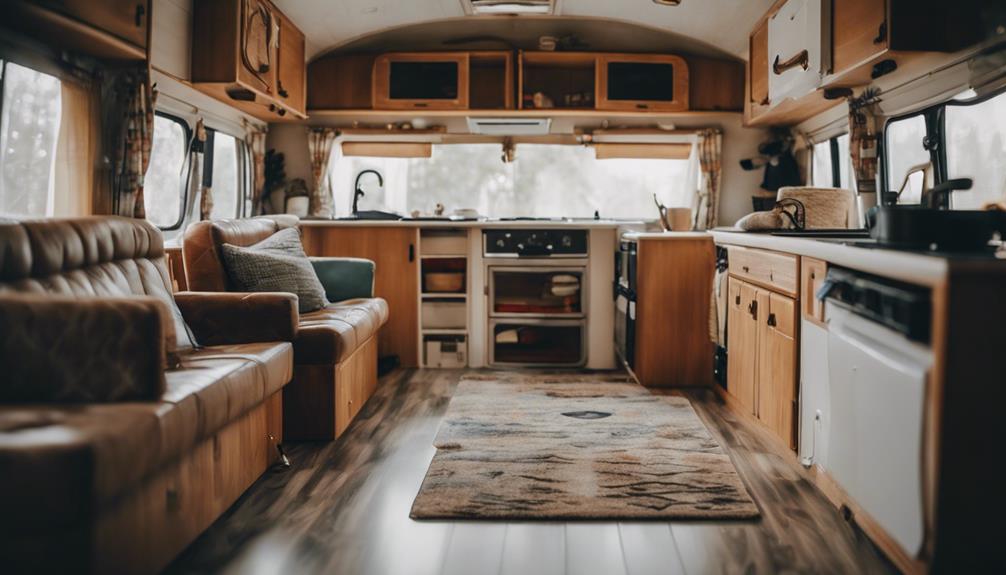
To keep your camper flooring in top shape, you need to master a few key maintenance practices.
Regular cleaning and understanding the installation process can make a big difference in longevity and appearance.
Let's explore the best techniques for routine upkeep and how the flooring installation impacts your maintenance routine.
Flooring Installation Process Overview
Start by thoroughly preparing the subfloor to guarantee a solid foundation for your camper's flooring installation. Remove any existing flooring, clean the surface, and make certain it's free from rust or debris. If needed, you might want to install a plywood subfloor for added stability.
Before you begin, allow your chosen types of flooring to acclimate to temperature for at least 48 hours. This prevents expansion or contraction after installation.
When it's time to lay down the flooring, use a high-quality adhesive to secure it firmly, especially for materials like Marmoleum or vinyl. This will help prevent lifting and establish a long-lasting bond.
After installation, make a habit of inspecting the edges and seams periodically. Reseal them with a waterproof sealant if necessary, especially in high-moisture areas, to prevent water damage and extend the lifespan of your flooring.
Following these steps in the flooring installation process will set you up for success. By taking these precautions, you'll make certain your camper's flooring remains durable and easy to maintain for years to come.
Routine Cleaning Techniques
Routine cleaning is essential to keep your camper's flooring looking great and lasting longer. Start by regularly sweeping or vacuuming your RV flooring to remove dirt and debris, especially in high-traffic areas. This step prevents scratches and wear.
For vinyl planks and laminate flooring, use a damp mop with a mild detergent to clean spills and stains. Avoid excessive water, as it can damage the material.
When it comes to carpets, vacuum frequently and address stains immediately with spot cleaning. Consider professional cleaning every 6-12 months for a deeper maintenance routine.
For eco-friendly cleaning, a mixture of vinegar and water works well on most flooring types, but always check manufacturer guidelines first to verify compatibility.
If your camper has cork flooring, remember to reapply sealant every few years to maintain its water resistance and prevent damage from spills.
What Flooring Material Would Be Suitable for a Mid Size Van Camper Conversion?
When considering the best flooring material for a mid size van camper conversion, vinyl plank flooring is a popular choice. It is durable, easy to clean, and comes in a variety of styles to complement your van’s interior design. Vinyl plank flooring is a practical and stylish option for the best camper conversion van.
Conclusion
Choosing the right flooring for your camper conversion is vital for guaranteeing durability and ease of maintenance during your travels. The best flooring options, like luxury vinyl plank or waterproof vinyl, provide scratch-resistant surfaces that can withstand high-traffic areas. These durable materials make cleaning a breeze, allowing you to spend more time enjoying your adventures and less time worrying about upkeep.
If you prefer eco-friendly choices, cork flooring offers comfort but requires regular maintenance, like resealing, to maintain its moisture-resistant properties. Consider linoleum, specifically Marmoleum, which provides water resistance and is easy to clean, although it may scratch more easily. Laminate flooring is another budget-friendly choice, but be sure to select moisture-resistant options to prevent warping.
Ultimately, regular maintenance, such as sweeping and mopping, is vital for prolonging the life of your flooring in camper conversions. This is especially important if you have pets or plan to use the space frequently. By selecting the right materials and committing to a maintenance routine, you can guarantee your camper's flooring remains functional and attractive for many trips to come.
Frequently Asked Questions
What Is the Best Flooring for Camper Conversion?
When choosing flooring for your camper conversion, consider options like vinyl for durability, cork for eco-friendliness, or luxury vinyl plank for aesthetics. Evaluate your needs regarding moisture resistance, comfort, and ease of maintenance to make the best choice.
What Type of Flooring Is Most Durable and Easiest to Clean?
When you're choosing flooring, consider luxury vinyl plank for its durability and waterproof features. It's easy to clean, and resistant to spills, making it a practical option for any high-traffic area in your space.
What Is the Best Flooring to Redo an Rv?
When redoing an RV, consider vinyl flooring for its durability and water resistance. It's easy to clean, perfect for high-traffic areas, and available in various styles to match your RV's aesthetic.
What Is the Best Subfloor for a Camper Van?
For your camper van, use 12mm marine grade plywood for the subfloor. It's moisture-resistant and durable. Don't forget to insulate with rigid foam board underneath for better thermal regulation and comfort while traveling.
Conclusion
In summary, choosing the right flooring for your camper conversion is essential for durability and ease of cleaning.
With options like vinyl, laminate, and rubber, you can find a fit that suits your style and needs.
Don't forget to take into account recent innovations that enhance performance and aesthetics.
By following maintenance best practices, you'll keep your floors looking great for years to come.
So, get ready to hit the road with confidence in your camper's flooring!

